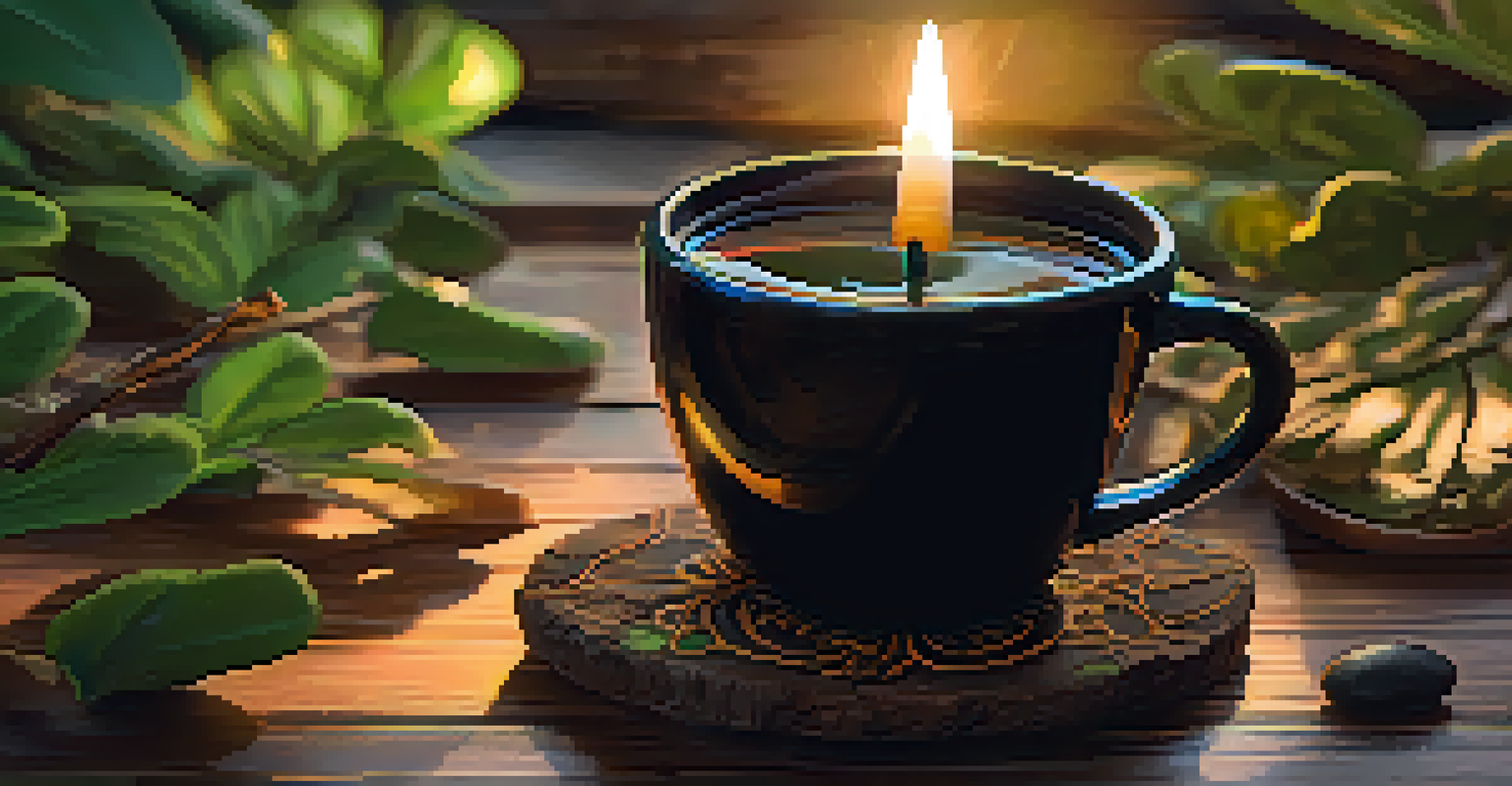The Role of Ayahuasca in Trauma Recovery and Healing

Understanding Ayahuasca and Its Origins
Ayahuasca is a traditional plant medicine originating from the Amazon rainforest, primarily used by indigenous tribes. This powerful brew combines the Banisteriopsis caapi vine and the leaves of the Psychotria viridis plant, creating a psychoactive experience. It has been revered for centuries for its potential to heal both physical and psychological ailments.
The wound is the place where the Light enters you.
The spiritual and ceremonial use of Ayahuasca has gained popularity outside its indigenous roots, drawing interest from people seeking profound healing experiences. Many believe that this ancient practice can provide insight into one's life and emotional struggles. As we delve deeper into its role in trauma recovery, it's important to acknowledge these cultural contexts.
While the therapeutic benefits are often anecdotal, recent scientific studies have begun to explore the effects of Ayahuasca on mental health. This intersection of tradition and modern science opens a dialogue about its potential in treating trauma.
The Psychological Impact of Trauma
Trauma can have a lasting impact on an individual’s mental and emotional well-being, often manifesting in anxiety, depression, and PTSD. These conditions can create a cycle of suffering that feels inescapable, leaving many seeking alternative therapies. Understanding the psychological effects of trauma is crucial for anyone considering treatment options.

Many people carry unresolved trauma from their past, which can hinder personal growth and happiness. It’s like carrying a heavy backpack filled with stones; the longer you carry it, the more it weighs you down. That’s where healing modalities like Ayahuasca come in, offering a potential way to lighten that load.
Ayahuasca's Healing Origins
Ayahuasca is a traditional Amazonian brew that combines specific plants, revered for its potential in healing emotional and psychological trauma.
Moreover, trauma can often lead to feelings of isolation and disconnection from oneself and others. Ayahuasca ceremonies, often conducted in group settings, can foster a sense of community and shared experience, which is vital for healing.
How Ayahuasca Facilitates Emotional Processing
One of the most significant ways Ayahuasca aids in trauma recovery is by facilitating emotional processing. During an Ayahuasca ceremony, individuals may revisit traumatic memories, allowing them to confront and process their emotions in a safe environment. This can lead to cathartic releases and a profound sense of relief.
Healing takes time, and asking for help is a courageous step.
The brew can induce altered states of consciousness, providing users with unique insights into their emotional pain. It's often described as a 'reset' button for the mind, similar to how one might clear a cluttered desk to gain clarity. This introspective journey can help individuals understand the root causes of their trauma.
Through this process, many report feeling a renewed sense of hope and purpose. The ability to face and integrate painful memories can pave the way for genuine healing and transformation.
The Role of Guided Support in Ayahuasca Ceremonies
Guided support is a crucial element of Ayahuasca ceremonies, often provided by experienced shamans or facilitators. These guides help create a safe and supportive environment, essential for participants to navigate their emotional experiences. Think of them as a lighthouse guiding you through the tumultuous waters of your inner psyche.
The presence of a knowledgeable guide can also enhance the therapeutic experience, offering comfort and reassurance when participants face difficult emotions. They are trained to recognize various emotional responses and can provide grounding techniques to help individuals stay centered during challenging moments.
Importance of Guided Support
Guided support from experienced facilitators is essential during Ayahuasca ceremonies, helping participants navigate their emotional experiences safely.
Additionally, the integration process post-ceremony is vital. Guides often encourage participants to reflect on their experiences and share insights, helping to solidify the healing that has taken place.
Integration: Making Sense of the Ayahuasca Experience
Integration refers to the process of making sense of the insights gained during an Ayahuasca ceremony. It’s not enough to experience profound revelations; individuals must find ways to apply these lessons in their everyday lives. This can often be the most challenging part of the healing journey.
Many participants find that journaling or discussing their experiences with a therapist can aid in this process. It’s akin to turning your thoughts into a roadmap that guides you toward healing. By actively engaging with their experiences, individuals can begin to shift their perspectives and behaviors.
Integration is essential for sustaining the benefits of the Ayahuasca experience. Without it, the insights gained may fade, leaving individuals feeling disconnected from their healing journey.
Potential Risks and Considerations
While Ayahuasca can offer profound healing, it's essential to approach it with caution. Not everyone is suitable for this type of therapy, especially those with a history of certain mental health conditions. Understanding the potential risks is crucial before embarking on this journey.
The experience can be intense, and some individuals may encounter difficult emotions or memories that can be overwhelming. It's important to have a strong support system and to be in a safe setting when participating in a ceremony. Just like any potent medicine, Ayahuasca requires respect and awareness.
Integration for Sustained Healing
The process of integration is crucial for individuals to apply insights from their Ayahuasca experience to their daily lives, ensuring lasting transformations.
Consulting with a healthcare professional or mental health expert before considering Ayahuasca is always a wise step. This ensures that individuals are well-informed and can make decisions that best support their healing journey.
The Future of Ayahuasca in Therapeutic Practices
As interest in alternative healing methods grows, the future of Ayahuasca in therapeutic practices looks promising. Research is expanding, with more studies exploring its effects on mental health and trauma recovery. This evolution could lead to greater acceptance and integration of Ayahuasca in mainstream healing practices.
Ayahuasca’s unique ability to promote emotional processing and spiritual insight may complement traditional therapeutic approaches. Imagine combining the wisdom of ancient traditions with modern psychology; this could create a holistic healing experience that addresses both mind and spirit.

However, as this practice gains popularity, it’s vital to maintain respect for its cultural origins. Authenticity and ethical considerations will be essential in ensuring that Ayahuasca remains a beneficial tool for those seeking healing.